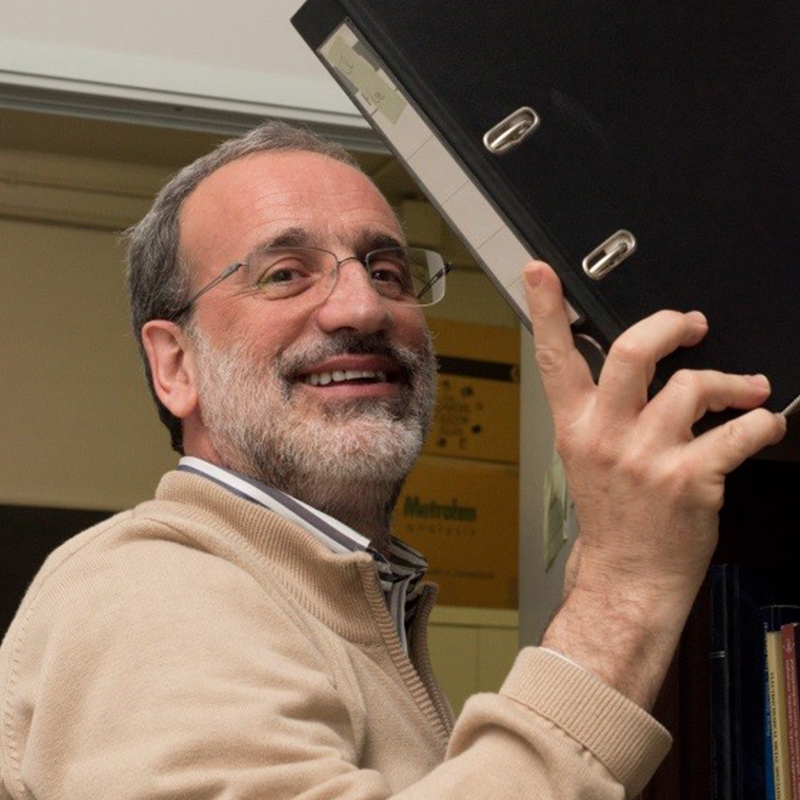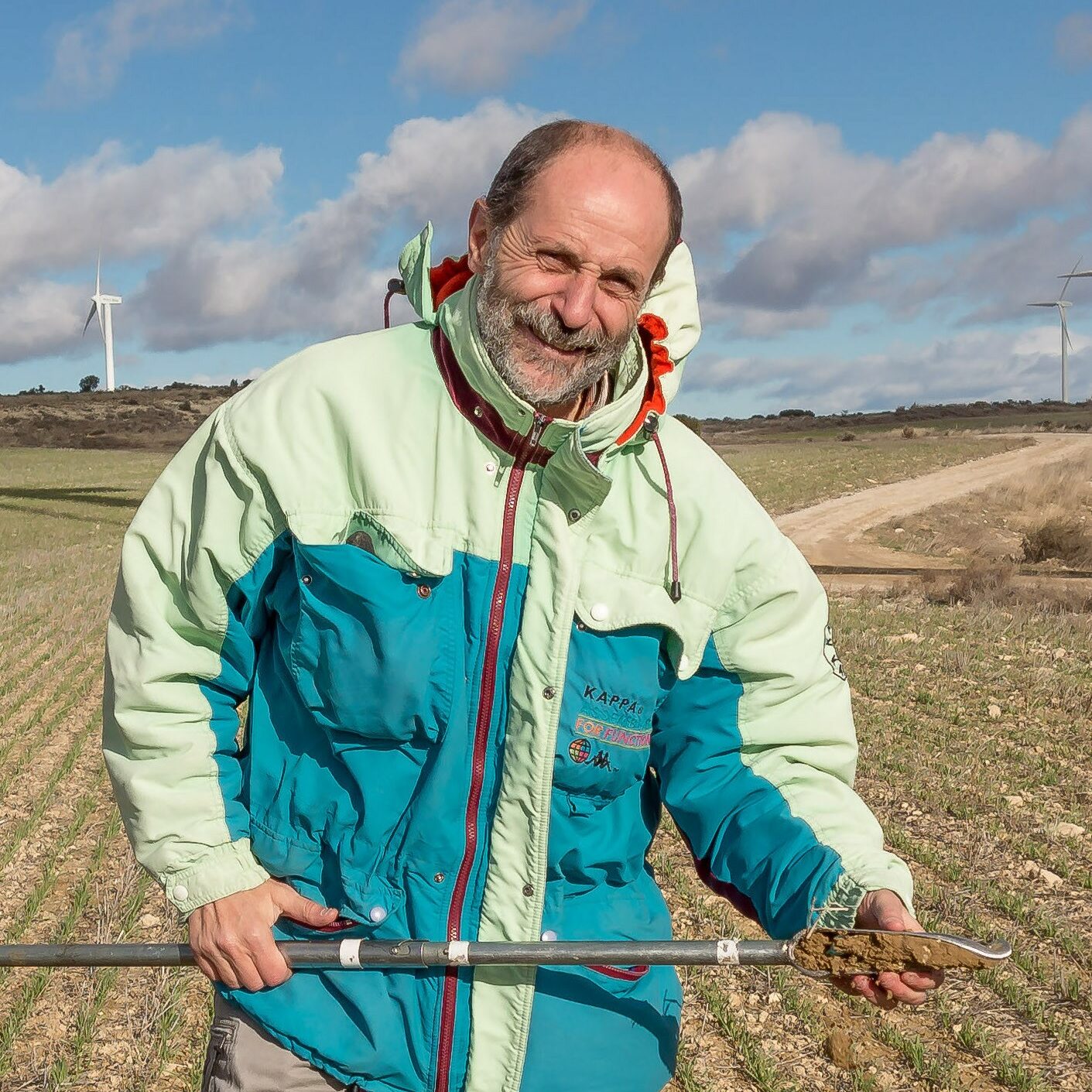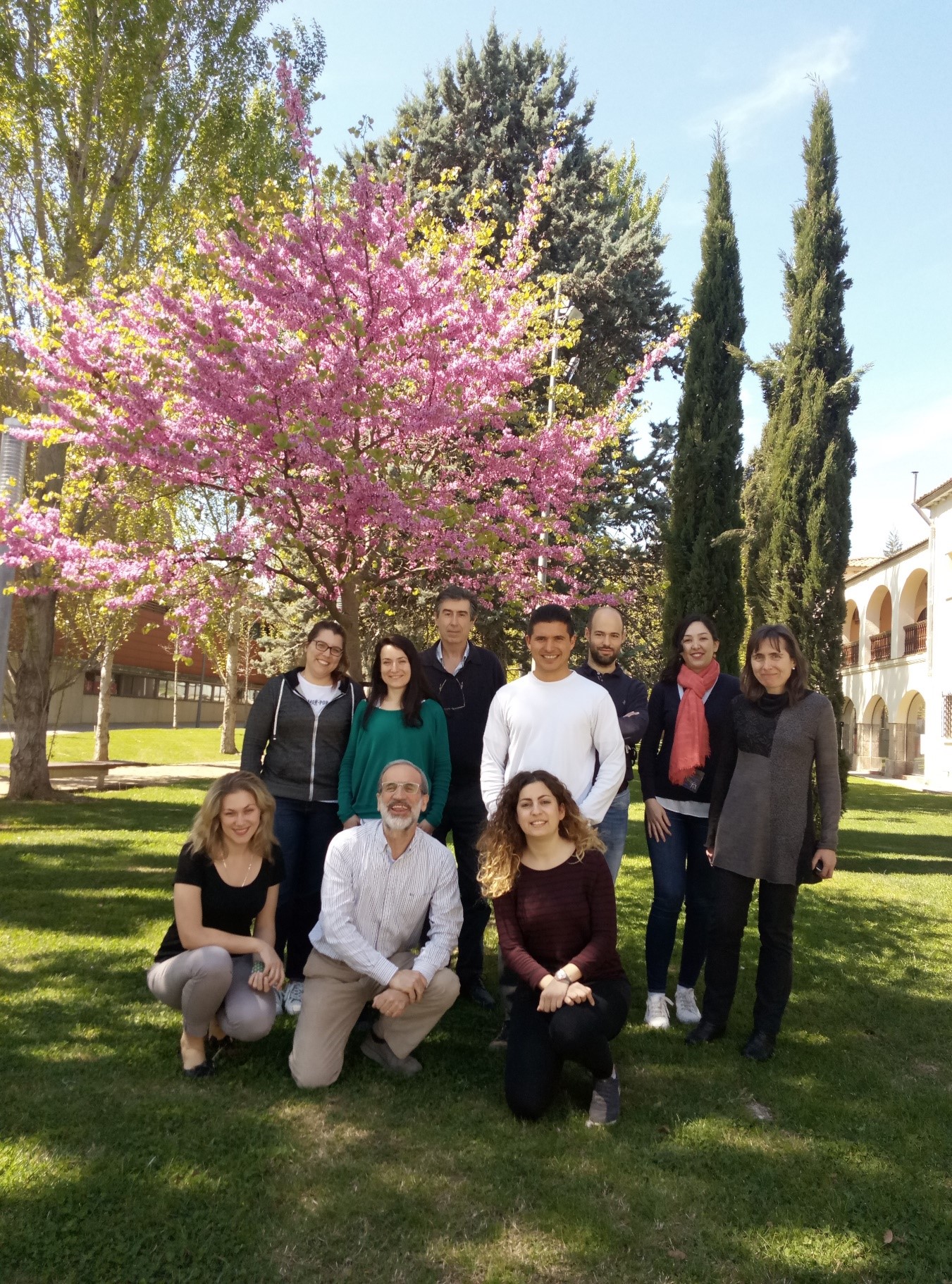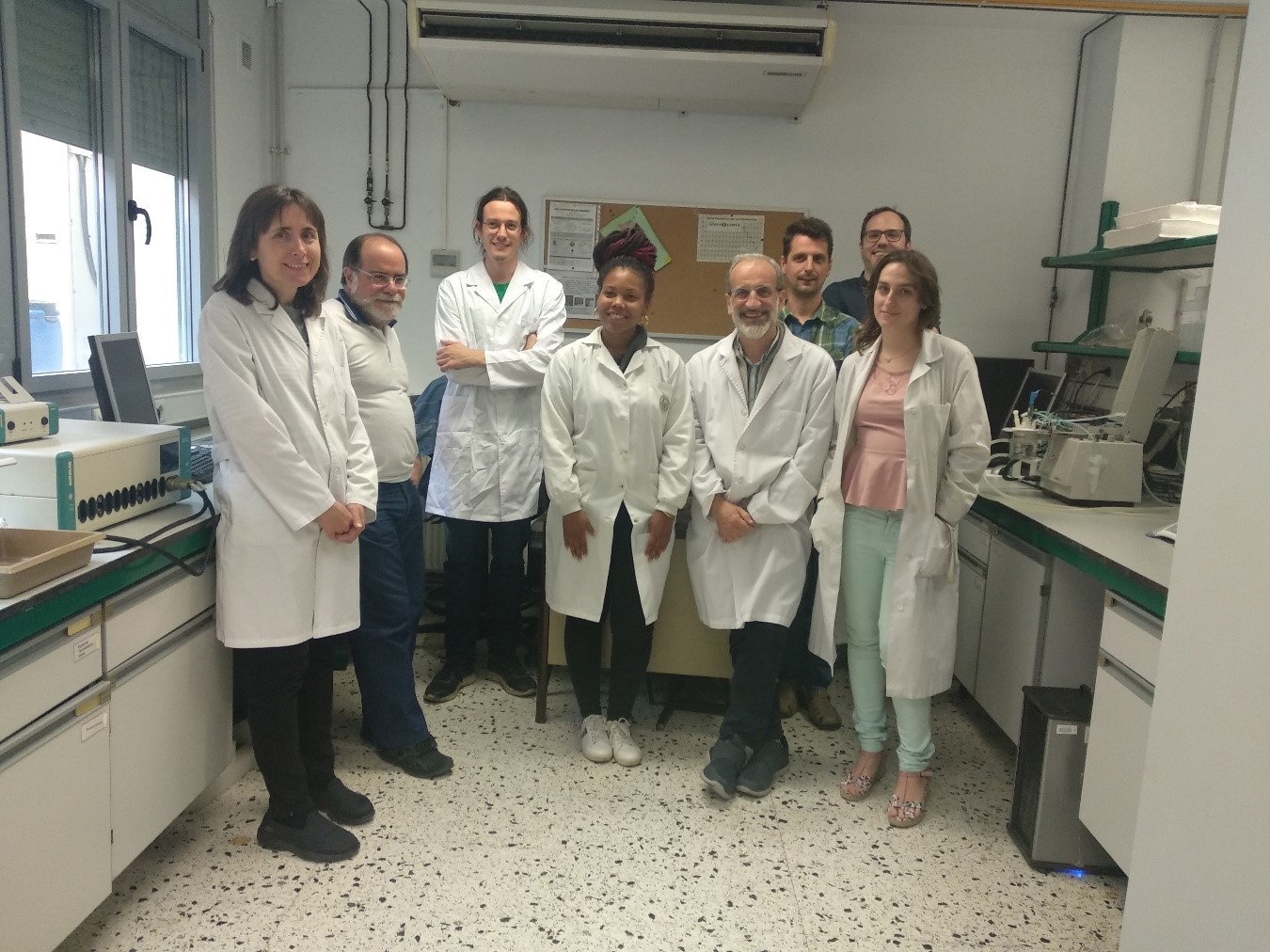AREA
CAA/ Agricultural and agri-food sciences
SUB AREA
AYF / Agriculture and forestry
KEYWORDS
MONITORING TOOLS; NUTRIENT MANAGEMENT (P, N, K, CA, MG, MICRONUTRIENTS) CROPS, FERTILIZATION; PREDICTIVE MODELLING; DGT/DET PASSIVE SAMPLING; SOLUTE IMAGINING TECHNIQUES; RHIZOTRONS; ANALYTICAL METHODS (ICP-MS). AGRONOMY, CROPPING TECHNOLOGY, SOIL-CROP-ATMOSPHERE RELATIONSHIPS
SUPERVISORY TEAM

PROF. JOSEP GALCERAN
Supervisor
Josep Galceran was born in Buenos Aires (Argentina) in 1955. He took a degree in Chemistry (1980) and became doctor (1994) by the Universitat de Barcelona. He has a long experience in teaching at undergraduate level, as secondary school teacher and headmaster (1980-1993) and later on in lecturing at the Univesity of Lleida (UdL) since 1991. He has done several international post-doc research stays in the summers (Oxford, Southampton and Geneva). He was head of the Chemistry Department in UdL (2001-2003) and participated in the foundation of the research centre AGROTECNIO (in Lleida).
He has participated in more than 35 research projects (either local, regional, national and international). As principal investigator (PI) in 6 Spanish projects, 3 European projects (BBMO #005199 FP6-2003, ENNSATOX NMP4-SL-2009-229244-2 and PyrMet EFA 15/08), one international cooperation project (El Salvador C/9412/07) and in one collaborative project (‘acción integrada’) with Portugal (HP2004-0066).
He has co-authored more than 150 communications in international conferences (more than 20 as speaker); > 8 invited or plenaries lectures in international conferences; > 120 articles in WOS, most in Q1 quartile. He has co-authored 2 chapters in the book Physicochemical Kinetics and Transport at Chemical-Biological Interphases of IUPAC series on Analytical and Physical Chemistry of Environmental Systems (John Wiley, 2004) and 1 chapter in the book Diffusive Gradients in Thin-Films for Environmental Measurements (Cambridge University Press, 2016).

JAUME PONT CAMPS
Co-Supervisor
Jaume Pont is the General Manager of the Granja de San Jose SA since 2000, previously Director of agricultural production since 1987. He has a master in Agronomy in the Faculty of Agronomy of Lleida belonging, then, to the Polytechnic University of Catalonia. He also has a background in Economics, Marketing and Financial organization by the ESADE Institution.
He is an experienced agronomist in charge of leading the main tasks of organization, planning and innovation of the farm Granja de San Jose. He has expertise in management of companies and business, vast knowledge of the sector and market, besides agronomical technical knowledge and in crop production technical aspects.

PROF. CARLOS CANTERO MARTÍNEZ
Co-Supervisor
Full professor of Agronomy in the Crop and Forest Sciences Dpt at University of Lleida, focused on the development of agricultural management practices for improving crop productivity and natural resources (soil and water) degradation processes. Leader of the Agronomy and Environment Research group, which has a long expertise (> 35 years) in developing solutions to real problems of farmers, cooperatives and farms, such as the Granja de San Jose, among others. He is coordinator of the Associate Unit in the High Research Council of Spain (CSIC) and Collaborator of the Spanish Research Agency (AEI).
He has participated in 44 research projects, speaker in 40 conferences, 45 scientific and technical courses, > 100 scientific publications (67 in SCI H index=29), 30 technical and scientific reports, and > 100 conference communications, 7 PhD theses, 170 graduate and master theses supervised. He collaborated in 35 teaching publications, 50 research and technical contracts, adviser of cooperatives and agricultural enterprises, performed > 100 activities for technical development and 20 specialized courses, participated in 35 technical publications.
RESEARCH GROUP
DESCRIPTION
The hosting group is composed by two Agrotecnio-CERCA research groups, focus on Environmental Chemistry and Agronomy.
The group of “Environmental Chemistry” brings together Chemists, Physicists, Biologists, Agronomical engineers and Mathematicians interested in the study of the distribution, transformations, physiological effects and the global cycling of elements in the environment, waters, soils and foods. In April 2021, it consisted of 2 full professors, 4 associate professors, 2 post docs, 1 assistant professor and 5 PhD students. The group was founded in 1987 by Jaume Puy, current rector of the UdL, and it has been growing ever since in international prestige and reputation. Our group aims at elucidating the availability of trace elements (such as Pb, Cd, Cu, Ni, In, As, etc.) and essential elements (such as Zn, Mg, Ca, K, P, N, etc.) by considering the basic physicochemical processes (such as diffusion, reaction, adsorption, complexation, dissociation, precipitation, etc.). We combine the development of theoretical frameworks and their comparison with experimental data obtained in synthetic systems and natural samples.

The group of “Agronomy” is composed by Agronomists, Soil and Crops Scientists. The group of Agronomy and Environment in Mediterranean Agricultural Systems is AN associated unit with the Soil Management and Global Change Research Group within Soils and Water Department at the Aula Dei Research Station (EEAD-CSIC) in Zaragoza city (Spain). In April 2021, 2 full professors, 2 associate professors, 1 associate principal researcher and 3 PhD students develop the research. The main objective is the development of appropriate agricultural management practices for improving crop productivity and controlling natural resources (soil and water) degradation processes. To achieve this objective, the research activities are focussed on the evaluation of main management practices (i.e., tillage systems, nitrogen fertilization, crop rotations…) and their impacts on soil and crop behaviour. More specifically, main research lines currently working are: 1) the quantification and simulation of the effects of tillage, cropping system and nitrogen fertilization on soil gas (NH3, CO2, N2O and CH4) emissions in Mediterranean agroecosystems, 2) the identification of spatial and temporal patterns of soil greenhouse gas emissions and their abiotic and biotic control factors, and 3) the evaluation of soil management impacts on soil and crop C and N dynamics and the interrelation between both components.

Both research groups compile expertise in the following related fields:
- Thermodynamic modelling of the speciation of metals with Dissolved Organic Matter (such as Humic and Fulvic Acids) relevant for natural waters and soils. We describe their specific binding with stepwise binding constants or with the Conditional Affinity Spectrum (concept introduced by our group).
- Dynamic aspects of metal ions and nanoparticles behaviour. This includes the quantitative description of the relationship between reaction and diffusion, using tools such as the lability degree (introduced by the group). We have modelled and measured bioavailability and biouptake.
- Emerging analytical techniques for metal speciation. We designed and keep developing the technique AGNES (Absence of Gradients and Nernstian Equilibrium Stripping) for a direct measurement of free metal ion concentrations. We work with DMT (Donnan Membrane Technique) and DGT (Diffusion Gradients in Thin Films) as key techniques to provide information on agronomic and environmental systems.
- Integrated application of agronomic technology for productive and environmental optimization of the Mediterranean Agricultural Systems. Focusing on the analysis of the productivity and sustainability of the field crop farming systems. Developing agricultural practices compatible for yield production and environmental protection and biodiversity conservation through a sustainable intensification. Developing and improving cropping technology for reduction cost, energy efficient use and input optimization. Assessing the impact evaluation of the agricultural practices on biodiversity conservation
- Quality improvement of the soil-crop-atmosphere system. Evaluating and development of cropping techniques increasing the soil conservation and water use efficiency in Mediterranean areas. Quantifying C and N dynamics in the soil-crop-atmosphere by simulation models. Quantifying loss of nutrients in soil degradation processes. Quantifying the soil C atmospheric-sink potential. Measuring and modeling of global warming mitigation by cropping technology management.
Both groups with their expertise have developed the research line on improving efficiency of fertilization through the design and optimization of new monitoring tools for nutrient management in field crops (P, N, K, Ca, Mg and micronutrients), which is of paramount interest to be progressed in the real situations of EU and which could offer an interesting scientific opportunity for the recruited fellow.
OUTPUTS OF RELEVANCE
The Environmental Chemistry group is an internationally recognized group for their contributions in fields such as: a) description of the protonation and complexation behaviour of humic matter; b) interpretation of the results of the widely-used in situ technique Diffusion Gradients in Thin-films and c) electroanalytical techniques for inorganic speciation. Thus, they have been invited for plenary lectures in international conferences and as members of international scientific boards.
The Agronomy group has been referent in Spain, but also in Mediterranean areas for the development of Conservation Agriculture, N fertilization optimization: Efficient use of mineral and organic fertilizers, and Integrated production management approach for improvement of productivity and environmental conservation. Also, they are referent in C and N dynamic characterization evaluating C-sequestration potential in the field crops in Spain and in the quantification of greenhouse gases emissions in the agricultural production.
NETWORK OF COLLABORATORS
Granja Sant Josep S.A., Spain
Vrije Universiteit Brussell (VUB), Belgium
Lancaster University (LAN), United Kingdom
Universität für Bodenkultur Wien (BOKU), Austria
Consejo Superior de Investigaciones Científicas (EEAD), Spain
University of Minnesota (USA)
Colorado State University (USA)
CAREER DEVELOPMENT
PROPOSED SECONDMENT
A short secondment of 3 months is proposed at the Granja de San José under the co-supervision of his manager Jaume Pont, which is a 1400 ha farm producing 120.000L/day of high quality milk with a crop-animal integrated production system. They are concerned about the environmental impact of the excessive use of organic and mineral fertilizers and are looking for an efficient use of them following a circular economy approach. The fellow will get a real insight on crop nutrition at farm level and explore practical knowledge application and technology transfer opportunities, as well as training on the job on specific topics related to crop productivity in relation to products quality.
Additionally, short research stays will be possible also at the network of collaborators.
DESIRABLE DEVELOPMENT
Employability
International mobility
Building collaborative networks
Fundraising (grants, projects)
TRAINING SKILLS
Project management
Time management
Grant writing
Leadership
Specific skills
OTHERS
Important relationships with national and international institutions and groups, such as Consejo Superior de Investigaciones Científicas, i.e Estación Experimental de Aula Dei (Spain), Colorado State University (USA), University of Minnesota (USA), Universidad de Mar del Plata (Balcarce-Argentina), Free University of Brussels (Belgium), Lancaster University (United Kingdom) and University of Natural Resources and Life Sciences (Austria).


